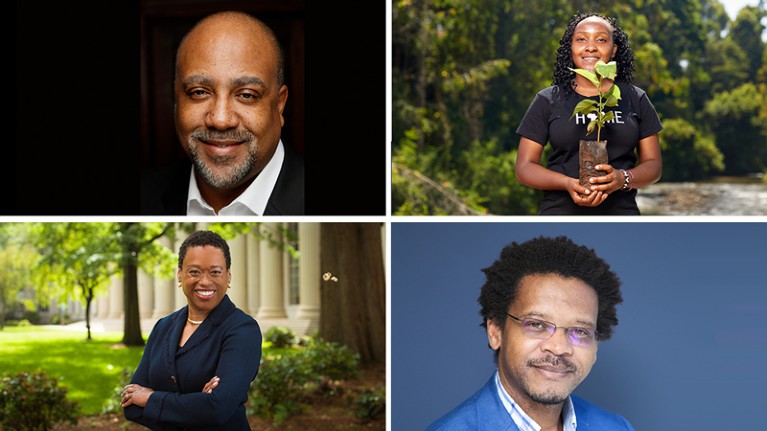
Clockwise from top left: Chad Womack, Elizabeth Wathuti, Ambroise Wonkam and Melissa Nobles.Credit: bottom left: Gretchen Ertl; bottom right: University of Cape Town
Science is “a shared experience, subject both to the best of what creativity and imagination have to offer and to humankind’s worst excesses”. So wrote the guest editors of this special issue of Nature — Melissa Nobles, Chad Womack, Ambroise Wonkam and Elizabeth Wathuti — in a June editorial announcing their involvement (M. Nobles et al. Nature 606, 225–227; 2022).
Among those worst excesses is racism. For centuries, science has built a legacy of excluding people of colour and those from other historically marginalized groups from the scientific enterprise. This legacy extends to research used to underpin discriminatory thinking, and outputs that ignore and further disadvantage marginalized people.
Nature has had a role in creating this racist legacy (Nature 609, 875–876; 2022). But after the killing of George Floyd by police in Minneapolis, Minnesota, in 2020, Nature committed to becoming an agent of change, and helping to end discriminatory practices and systemic racism.
This special issue is part of that commitment, and the first in this journal’s history to be guest edited. We are grateful to our guest editors for accepting our invitation to edit this special issue; for the time and care they have devoted to this project; and for their wise guidance at every step. They have inspired us.
We would also like to thank all those who contributed to this issue, including our two early editorial advisers, Craig Wilder, a historian at the Massachusetts Institute of Technology in Cambridge, and Fauzia Ahmad, a sociologist at Goldsmiths, University of London (Nature 582, 488; 2020). Their guidance was instrumental in shaping our June 2020 editorial (Nature 582, 147; 2020).
This issue can only scratch the surface of such a vast topic, and will be followed by others that examine different facets of racism in science. This experience has changed us in more ways than we can know — and we are more committed than ever to playing our part in helping to build a future in which science’s shared experience is truly shared by all.

 Ending racism is key to better science: a message from Nature’s guest editors
Ending racism is key to better science: a message from Nature’s guest editors
 ‘It’s a constant hum’: a planetary geologist calls out racism in academia
‘It’s a constant hum’: a planetary geologist calls out racism in academia
 The first Indigenous female surgeon in Canada is battling for health justice
The first Indigenous female surgeon in Canada is battling for health justice
 The geoscientist fighting for universities to confront systemic racism
The geoscientist fighting for universities to confront systemic racism
 ‘There’s no space for us’: an Indigenous-health researcher battles racism in Australia
‘There’s no space for us’: an Indigenous-health researcher battles racism in Australia
 ‘I was treated as if I was dirty’: a paediatrician decries racism against African scientists
‘I was treated as if I was dirty’: a paediatrician decries racism against African scientists
 Computer science has a racism problem: these researchers want to fix it
Computer science has a racism problem: these researchers want to fix it
 Counter the weaponization of genetics research by extremists
Counter the weaponization of genetics research by extremists
 Skin colour affects the accuracy of medical oxygen sensors
Skin colour affects the accuracy of medical oxygen sensors
 The unseen Black faces of AI algorithms
The unseen Black faces of AI algorithms
 Imperialism’s long shadow: the UK universities grappling with a colonial past
Imperialism’s long shadow: the UK universities grappling with a colonial past
 A Jamaican medicinal-plant scientist explores his African roots
A Jamaican medicinal-plant scientist explores his African roots
 Science must overcome its racist legacy: Nature’s guest editors speak
Science must overcome its racist legacy: Nature’s guest editors speak
 How Nature contributed to science’s discriminatory legacy
How Nature contributed to science’s discriminatory legacy
 Systemic racism: science must listen, learn and change
Systemic racism: science must listen, learn and change
 Want to do better science? Admit you’re not objective
Want to do better science? Admit you’re not objective




